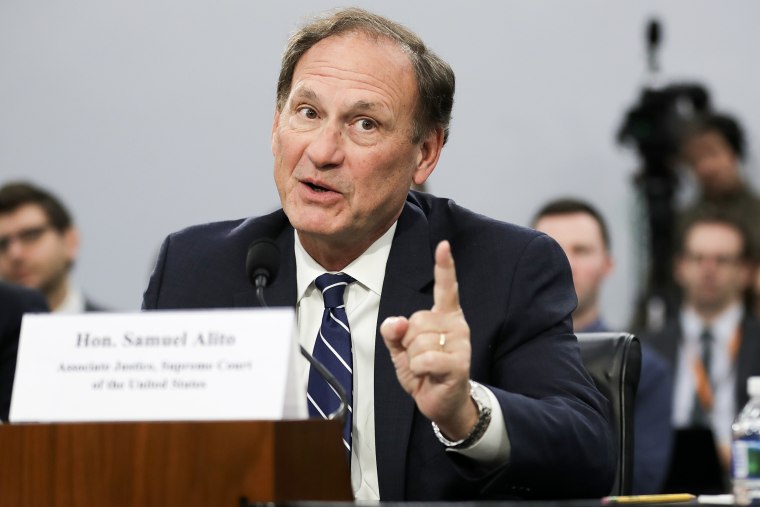WASHINGTON — The Supreme Court on Tuesday probed Congress' power to tax certain business entities in a case that could have implications for any future effort to enact a wealth tax on the super-rich.
The case had previously attracted scrutiny after Justice Samuel Alito rejected claims that he should not participate in it because of his ties with one of the lawyers challenging a one-off tax on foreign corporate investments.
During oral arguments Alito asked sharp questions of the federal government's lawyer as the Biden administration defended the tax, which was imposed as part of the 2017 tax law enacted by the Republican-led Congress and signed into law by President Donald Trump.
Fellow conservative Justice Neil Gorsuch asked similar questions skeptical of the government’s arguments. Other justices appeared less critical, asking how broadly a ruling against the government could sweep, potentially imperiling existing tax provisions.
The questions suggested the court, which has a 6-3 conservative majority, could uphold the tax on narrow grounds.
The case, Moore v. U.S., concerns a novel constitutional question about whether people can be forced to pay taxes on stakes in foreign-owned companies even if they have not derived any income from them.
David Rivkin, one of the lawyers involved in the case against the federal government, interviewed Alito in two articles published in The Wall Street Journal that addressed recent claims of ethics violations on the court and the power of Congress to legislate on the issue.
Rivkin represents Washington state-based Charles and Kathleen Moore, who invested in an India-based company. He is not arguing the case Tuesday.
It is a rare occasion for the Supreme Court to delve into the meaning of the Constitution’s 16th Amendment, which outlines Congress’ power to order the collection of income taxes.
Some tax experts say the case could have broad ramifications, leading to more challenges to other tax provisions and potentially threatening any future effort to enact a wealth tax.
The case focuses on a provision of the 2017 Tax Cuts and Jobs Act that imposed a one-off tax on shares held in foreign companies. It stated that people could not defer paying taxes on ownership stakes in such companies.
The Moores say that in 2005, they invested $40,000 in a company called KisanKraft Machine Tools. Although the company was profitable, they say they did not receive dividends, with the money instead being reinvested in the business. Because of that, the Moores did not pay taxes on what the U.S. government defined as income from the company from 2006 to 2017.
After the new law was enacted, the Moores ended up paying almost $15,000 in additional taxes, which they then sought a refund for. They argue that the tax was unlawful on the grounds that an increase in the value of a capital investment does not constitute income.
Alito repeatedly probed what else the government could tax if the court were to embrace the arguments made by the Biden administration, such as taxes on gains in property value and investments.
"How far may Congress go in attributing income to someone who has not realized that income in the standard understanding of that term?" he asked Solicitor General Elizabeth Prelogar.
Alito also told Prelogar that because there was much media coverage of how broadly the Moores' arguments could apply, "I think it's also a fair argument to do the same thing with your position."
Gorsuch appeared to share Alito's view.
"I’m just asking what the limits of your argument are, and, it seems to me, there are none," he told Prelogar.
But Gorsuch also conceded later in the argument that "there is room for some narrow ground."
Liberal Justice Elena Kagan was among those who wondered whether other tax provisions would be threatened if the Moores prevailed.
"Why is it that you think we can decide for you without putting any of those kinds of very established taxation schemes at risk?" she asked Andrew Grossman, the lawyer arguing the case for the Moores.
A federal judge and the San Francisco-based 9th U.S. Circuit Court of Appeals both ruled in favor of the government, prompting the Moores to seek Supreme Court review.
In September, Alito issued a statement saying there was “no valid reason” for him to step aside in the case,
After it faced pressure for months over alleged ethics lapses, the court last month announced a new code of conduct that immediately attracted criticism because the justices are left to enforce it themselves.

